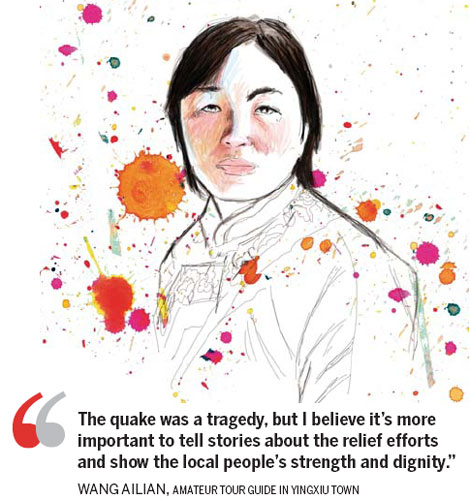Rebuilding houses, families and hope
A guiding light after a dark disaster
Farmer Wang Ailian spends her days strolling around Yingxiu town's quake ruins, looking for customers.
The 42-year-old says there is little she can do to make a living aside from work as a tour guide for visitors, who come to see firsthand how people are faring after the Wenchuan earthquake. The disaster left more than 6,000 dead in Yingxiu.
Wang is one of dozens of women who have taken to the tourism trade because they're unable to find other work after the disaster.
She tells stories as she guides outsiders through ruins that have been preserved as memorials, such as the town's previous primary school, the mass grave where the thousands of dead are interred and the temblor's hypocenter crater just outside town.
Visitors normally pay 50-100 yuan ($7.93-15.88) for a guide. But Wang is willing to accept much less.
"I'd take 20," Wang says.
Her husband works part time as a migrant worker and has unstable income. Wang can earn up to 300 yuan on the best days. She tried running many small businesses before joining the guides in 2011.
"My business was too slack," she says. "I had to find a better way to make a living. But I really had no idea whether I could."
At first, she thought she was too old for the job but soon realized her advantages.
She is one of the few guides who attended high school. And she learned standard Putonghua during her years in the Xinjiang Uygur autonomous region.
"I know the places and the ruins well. And, of course, I know the quake. I lived it," she says.
She started by memorizing introductory lines provided by the local government and carefully observed how the trained guides worked. She still remembers her first day on the job.
"I was nervous," Wang says. "I prepared my words carefully. But when I stood in front of my customer, my words disappeared."
Her only customer that day politely suggested she "do better homework".
Wang spent the following weeks waking up early to practice her lines and would repeat them again before bed. She gradually became more comfortable and flexible with her presentations.
"Some customers are surprised and ask if I'm a professional guide," she says, smiling.
But she has buckled down and even learned some important seismological facts to include.
She asks neighbors to search the Internet for information visitors ask about that she doesn't know.
When Wang noticed there were sometimes foreigners, too, she began brushing up on the English she hadn't used since high school and studied English quake terms. "One time, I was courageous enough to guide a foreigner," Wang says, laughing.
Wang returned from Xinjiang after her first husband died. She married her current husband in 2006.
Her family, like many others, endured extreme financial difficulties after the disaster.
After the quake, she strapped a basket to her back and salvaged useful items from her destroyed home to bring back to the tent in which her family lived. They survived on donated money and clothes, Wang recalls.
"But that's nothing," Wang says. "I'm just thankful none of my family members died."
Wang was working in the fields when the quake struck. Her son was the only 4th grader to escape the school building alive.
Wang's perspective on her work has evolved over time. She believes quake zones are nothing like other tourism sites. "The quake was a tragedy, but I believe it's more important to tell stories about the relief efforts and show the local people's strength and dignity."
Her role, she believes, is that of a "window".
"I want to show them we've really recovered and are living good lives."
And Wang is preparing for the next step - taking the qualification exams to become a certified guide.
Li Yu in Chengdu contributed to this story.















